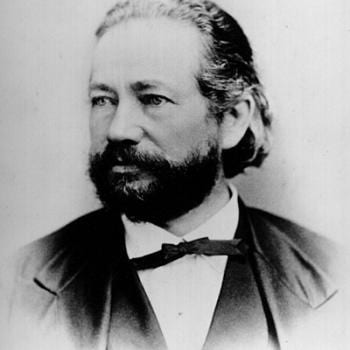
Over the past several decades, Reformed theology has enjoyed what has been called, in the spirit of the Reformers themselves, an ad fontes, a return to the sources, movement. The works of the sixteenth and seventeenth-century Reformers are now more widely appreciated and studied thanks (and translated), in part, to the work of Richard Muller, and others, who have spent their careers drawing from obscurity the wisdom of the past. The result has been a broadening, deepening, and enriching of Reformed theology.
I entered graduate school at just the right time to be able to reap the fruits of these labors. As I write this, I look at my own dog-eared, sticky-note laden set of Richard Muller’s Post-Reformation Reformed Dogmatics— a Christmas gift to a penniless pupil— with great admiration for both Muller himself and the theology of the men contained therein (you’ll meet ones you’ve never heard of before). (Do read this reflection on Muller’s legacy by Michael Lynch at Mere Orthodoxy).
One does not have to read the seventeenth-century Reformed orthodox for long before, so long as he is paying attention to the footnotes, notices the eclectic nature of their source material. I had a professor of historical theology in seminary that would remind us that if you are doing good Reformed scholastic theology, you can use any source you like. Be it Gandhi, Mother Theresa, or Yoda, so long as you prove the veracity of the idea and its conformance to orthodoxy, the source becomes almost irrelevant (except insofar as its reputation may add weight to the claim).
This is, indeed, a common element of all academic literature of the post-Renaissance period, but was, in my estimation, especially so in the works of the English Puritans in the period of High Orthodoxy (1620-1700). By nature of their education, influenced by medieval methods of thought and the humanist passion for the works and languages of antiquity, the Puritans were men of letters, what we might call classicists. And so, it is no uncommon thing to find Puritan theological and even devotional texts full of quotations of, and allusions to, the likes of Seneca, Plutarch, or Cicero, to name a few favorites. (See S.J. William Costello’s brilliant, exhaustive study of scholastic curriculum at Cambridge in the seventeenth century, as well as Samuel Eliot Morrison’s two-volume treatment of the same subject at the other Cambridge).
John Winthrop once notoriously chastised Nathaniel Ward (perhaps the best legal mind of Massachusetts Bay at the time) for use of pagan sources (i.e. citations to antiquity) in an election sermon. But in this case, Ward was the one standing in greater continuity with his own tradition and reflecting the intellectual milieu of the day. Of course, Winthrop too (per his library records) was well versed in Plato, Aristotle, and other ancient texts. This fact reveals the lesson of Winthrop’s critique. Even though he was probably overreacting to Ward’s sermon, he did, in fact, critique Ward’s ideas, noting that Ward grounded “his positions much upon the old Roman and Grecian governments, which sure is an errour, for if religion and the word of God make men wiser… we may better frame rules of government for ourselves.” Winthrop’s real beef with Ward, then, probably had something to do with bare, unqualified appeals to ancient precedent. If said appeal included the Athenians, then it may have smacked too much of “mere” democracy for Winthrop to stomach. Even still, it is not as if Ward was ever disqualified from ministry for this move. It was he who drafted the first code of laws for the colony at the order of the General Assembly (and Governor Winthrop).
As true sons of the original ad fontes movement, the Puritans, as well as those on the Continent— see e.g. Neils Hemmingsen’s (Melanchthon’s Danish protégé) treatment of the natural law, which was (intentionally) drawn only from extra-biblical sources— made great use of the Patristics, medieval doctors, and classical sources. (A contributing factor to the absence of this eclectic disposition in contemporary evangelicalism is departure from the western natural law tradition that was perpetuated by the Reformed Orthodox of the seventeenth century all the way through to the nineteenth century. Not coincidentally, evangelicals began ditching the natural law [and natural theology generally] right about the time that legal positivism began dominating jurisprudence.)
Describing the intellectual heritage of the seventeenth century Puritan, Perry Miller wrote,
Being a Protestant, he had the vast literature of Protestantism to supply the main outlines of his system; yet because he lived a century after Luther and Calvin he could view the first reformers in perspective, go beyond them or dissent form them when he had reason or Scripture to warrant him. Being an Englishman, on the edge of the Protestant world and always a little remote from his continental brethren, he could select what he saw fit from the works of Dutch, German, or Swiss Calvinists, and meanwhile take up from indigenous traditions, particularly from English legal and political theory, whatever supported his convictions. Like all Protestants, he had revolted against the sway of medieval schoolmen, without having discarded the immense accumulation of scholastic thought, which lay before him like an Aztec city before the plunderer. He was still exhilarated by the revival of learning; Erasmus was as much his intellectual progenitor as Calvin, and he could seize upon the spoils of the heathen to furnish the trophies of Christianity. Finally, because his theology taught that whatever was practically useful was contrived in the providence of God, he could welcome without trepidation advances in logic or method, in science or invention once these demonstrated their utility. Thus, the Puritan scholar in the first half of the seventeenth century ranged at will through the spacious chambers and hoarded treasures of a rich intellectual inheritance.
Whilst Miller (as in the rest of the New England Mind) mischaracterizes or exaggerates a few things (such as the alleged “revolt” against the schoolmen; this was always qualified) but he nails the general spirit, scholarly outlook, and intellectual confidence of the men he described.
Of course, seventeenth century Reformed writers also reverently quoted and commented on the magisterial Reformers not mentioned by Miller, namely, Melanchthon, Bullinger, Beza, Vermigli, and Zwingli. Naturally, like scholars of any period, the Reformed orthodox interacted with their contemporaries as well. But what may surprise readers is that the Reformed also freely and regularly employed the insights of their opponents.
George Gillespie (1613-1648), one of the Scottish delegates to the Westminster Assembly and an ardent defender of Presbyterianism, provides a helpful example of this. In his famous defense of Presbyterian distinctives and refutation of Erastianism, Aaron’s Rod Blossoming (1646), cited a diverse array of sources. In so doing, Gillespie did not seem to think that his dogmatic assertion of de jure Presbyterian polity would be hampered in any way. Yet, when citing a potentially suspect source, he almost always made his intentions clear to the reader and distanced himself from the undesirable positions of said source.
For example, at one point, in arguing that churches require a distinct government from the civil government, and that church discipline is distinct from civil punishment, he approvingly quotes Hugo Grotius, the natural law theorist most well known today for his On the Law of War and Peace (1631). Indeed, Grotius was frequently cited by Reformed theologians. Samuel Rutherford’s Lex Rex (1644) features multiple appeals to Grotius, as well as to other legal scholars outside Rutherford’s own camp, especially the Jesuits Francisco Suárez and Gabriel Vasquez.
But since Grotius was a notorious Arminian, Gillespie was sure to note that his reference to Grotius was qualified. Citing Grotius’ Annotations on the New Testament (1646), Gillespie wrote, “Grotius (otherwise no good friend to church government, being poisoned with the Arminian principles, who have endeavoured [sic] to weaken extremely the authority of classical and synodical assemblies, and to give a kind of papal power to the magistrate), yet, in this particular, he argueth strongly for us, and not against us.” (pp. 148-149). The young Scotsman penned this line without a hint of irony, but rather a desire to prove the validity of his own argument by an appeal to a credible and well-known source, but not absent the requisite caveat.
The mid-seventeenth century was a different time, and what is brutal rhetoric to modern ears was both conventional and acceptable in Gillespie’s day— Gillespie looks soft compared to Luther. Blunt denunciation of one’s opponents was expected if not welcomed. At times, one longs for the days when such was the case. Yet, it is the spirit and purpose of Gillespie’s words, not necessarily the letter, that should extract veneration from modern readers. He was, like most authors then, eclectic in his source material, but almost always clear regarding the end to which he employed said sources. Such strong and extensive denunciation of questionable sources is not necessarily required by modern authors, but the principle of clarity exhibited by Gillespie is greatly needed.
In short, Christian commentators today need to recover what Oscar Wilde called “the university manner,” that is, the ability to “play gracefully with ideas.” This is not the same as being flimsy or careless with them. Nor is it the same as being an intellectual pushover. Rather, it is what our theological forebears of the confession age modeled.
It is incumbent on Christian professors, theologians, and pastors to be clear and honest in all forms of communication. They owe this to the church of Christ which they serve. When a scholar or pastor is unclear, especially in a way that implies questionable doctrinal conclusions on the part of the scholar or pastor, critique is justified. Church leaders should not recoil from this but welcome it. Public statements invite public critique. This is not a violation of Matthew 18 or the ninth commandment and redirecting everyone who asks earnest questions to Google— a habit of some evangelical “thought leaders” on Twitter— is not an appropriate response. At the same time, ideas and the way in which sources are used must be (in most cases) the subject of critique more so than the source itself.
It is a mark of Reformed Christians that they are discerning and active listeners. This is but one of many positive results of the Reformation’s making the sermon medium central to worship and the Christian life. The occupant of the pulpit is expected to present well-reasoned, instructive and edifying content drawn chiefly and demonstrably from Scripture. In turn, the congregation is duty-bound to be active, focused, and engaged listeners, not mere consumers. In so doing, the congregation must endeavor to fully and charitably understand, evaluate, and critique the message being propounded from the pulpit. In this way, the sermon, as the primary means through which the spirit of God is present with his people in an especial way, is not a one-way street. It is not a lecture. Intake of information is not the only goal. Rather, the right proclamation of the word is a participatory act for both speaker and hearer.
This means, inter alia, that Christians cannot be “sound bite” listeners. Here I have in mind the type of reactionary listener bred by over-consumption of the drivel that is peddled as news by modern media outlets. This kind of listener lies in wait for the sound bites to which they are predisposed to accept or reject and, on this basis alone, formulates their opinion of the ideas in play. Ideas then become synonymous with the messenger. This approach is both lazy and detrimental to fair and reasoned discourse. If evangelical Christians really want to recover the Reformation heritage in full, they will cease and desist such practices immediately and begin again to be active, discerning listeners, both in the pew and online.
Instead of evaluating a speaker based solely on the source he cites, we should evaluate his arguments based on the truth it contains and the grace with which he plays with ideas. Contrary to popular narratives, there has never been a radical antithesis between Christianity and free inquiry. As Al Mohler expertly pointed out in a recent Briefing episode, the arguments of someone like John Milton (in his Areopagitica (1644)) are only sustainable in a context where objective truth is not only believed in abstractly or in principle (as being attainable) but believed in substantively. I have written elsewhere on how the erosion complete demolition of these prerequisite assumptions has led to proxy wars over certain liberties that are, at root, an expression of confusion over what values must govern said liberties and what good they should be ordered to.
Returning to the matter at hand: George Gillespie was comfortable citing John Selden, an Erastian parliamentarian, in his polemic against Erastianism, of all places. Selden was a polymath and world-renowned Hebraist (who may have pioneered the comparative method). Gillespie, therefore, was happy to appeal to Selden in the sections of Aaron’s Rod that analyzed the Old Testament Jewish polity. This use of Selden was more than appropriate because none could impeach (or rival) Selden’s expertise in that field.
The first point here is that pastors and theologians should consult and cite the best sources. Selden was the best. And if a controversial source is resorted to, as Selden could have been in some circles, they should ensure, for the sake of their listeners, that the source contains indispensable insights found nowhere else, and that they are clear about how, and why they are using it.
The second point is that the full range of ideas associated with a source cited cannot necessarily be imputed wholesale to the one doing the citing. The much more nuanced task of discerning both the argument itself and the usage of the source in question within said argument is required.
To invoke a contemporary example, Patrick Deneen, in his 2018 bestseller Why Liberalism Failed, cites both Karl Marx and Erich Fromm, the former more than once. Fromm is mentioned in conjunction with Hannah Arendt and Robert Nisbet to demonstrate the range of philosophers and sociologists that recognized that “a signal feature of modern totalitarianism was that it arose and came to power through the discontents of people’s isolation and loneliness.” As people disband their local associations, the Burkean “little platoons,” they aimlessly search for belonging elsewhere. The story told by Fromm and others is that, weakened by this displacement, delocalized people fall into the arms of the state, thereby giving up their freedom. The work cited by Deneen is Fromm’s most famous, Escape from Freedom. Fromm, in my opinion, is the only Frankfurt School member that can be read for pleasure. Although he recites a rather skewed history in Escape, its insights are undeniable, viz., that people cannot hand, indeed were not made for, total rootlessness, radical autonomy. Fromm’s shorter Beyond the Chains of Illusion helped me better understand both Marx and Freud individually but more importantly how the Frankfurt School integrated the two. It is a fascinating and highly readable volume.
All that to say, Fromm is used by Deneen positively, if briefly. But this by no means implies that Deneen is a critical theorist. He does not use Fromm as a critical theorist, nor does he site Fromm for a particularly critical theory-ish insight, but rather one shared by other noteworthy thinkers. If someone were to judge Deneen by the index alone, however, he might be accused of exactly what he is not doing. Similarly, Deneen mentions Marx multiple times throughout the work. Early on he recalls Marx’s insights,
Marx once argued that the greatest source of economic discontent was not necessarily inequality by alienation—the separation of worker from produce and the attendant loss of any connection with the goal and object of one’s efforts. Today’s economy not only maintains and extends this alienation but adds a profound new form of geographic alienation, the physical separation of beneficiaries of the globalized economy from those left behind. This leads the economic winners to combine lamentations of economic inequality with sotto voce denunciations of the backward views of those who condemn globalization’s course. The losers, meanwhile, are consoled with the reminder that they are wealthy beyond compare to even the wealthiest aristocrats of an earlier age. Material comforts are a ready a slave for the discontents of the soul.
Again, Deneen is not using Marx as a Marxist, nor is he endorsing a dialectical view of history, nor a materialist conception of the world, nor is he making class antagonism the central driver not only of history but of humanization. Nor is he denying the reality of God nor the legitimacy of religion. As a traditional Catholic, we would hardly expect Deneen to be doing any of those things. What Deneen is doing in the chapter from which the quote above is drawn is critic globalization and the excesses of a market economy which, he argues, has been pursued at breakneck speed by both liberals and conservatives over and against any other consideration. Regular people, average workers, have been left behind by this growth. But it is not just the inequality that damages them. People have souls and other needs that transcend material prosperity. But recent monetary policies have not factored this in, that is, the economy has been ordered to itself, as if itself was the final end. It has not been ordered to the common good and human flourishing. To pacify those left behind, they are commodified. They are treated as nothing more than consumers and their basest appetites are fed relentlessly. This is not a particularly Marxist argument, but Marx identified something of the germ of it, and Deneen runs with it for a bit.
Is Deneen a Marxist? Not even close. (For goodness’ sake, he is an endorser of Ryszard Legutko’s must-read book, The Demon in Democracy, which I have mentioned on this site before, and which is essentially a 200-page prosecution of Marxism and liberalism; the former being a species of the latter genus per Legutko.)
Is Deneen a third-wave Frankfurt Schooler? As someone who, like Adrian Vermeule, spends a good deal of their time lamenting the loss of traditional morality and the concomitant restraint, and who envisions the project of Herbert Marcuse (embodied by the New Left) as the fulfillment of John Stewart Mill’s repudiation of all arbitrary constraints, he could hardly be said to be a critical theorist. The influence of Adorno and Marcuse are exactly what distresses him. His brief acknowledgement of Fromm hardly negates this. Deneen shows no signs of adopting a critical theorist (or classical Marxist) worldview. The way in which he uses both Fromm and Marx, albeit limited, matters.
Deneen’s usage of Marx and Fromm— who, by the way, presents infinitely more complex and rich scholarship than his contemporary progeny, Robin DiAngelo being, perhaps, the most simplistic and boring member of that tradition— is easily distinguishable from, say, Matthew Hall’s use of ideas drawn from Critical Race Theory (CRT) in his infamous interview with the Coffee and Cream podcast. There Hall invokes ideas found nowhere else but from Critical Race Theorists and uses them exactly as they were intended to be used for the exact purpose the were intended to reach. Though Hall seems to have walked back some of his previous statements—something he should certainly be permitted to do—he used similar CRT concepts on an interview with the Jude 3 Project. In other clips that have made the rounds he was lauded by fellow faculty for being well-versed in CRT.
Another interesting case like Deneen’s is that of Christopher Lasch, the Marxist historian turned traditionalist conservative. He is a favorite of conservative post-liberals today and a seminal critic of modernity. Yet, even after his ideological conversion he never abandoned the use of Marx and critical theorist sources. But as with Deneen, Lasch employed them in an entirely different way than he had in his previous life.
Condone Cone?
Now, for another illustrative example of what I am talking about. This time in the negative, so to speak. Last year, in an article for the New York Times entitled “Can Black Evangelicals Save the Whole Movement?,” Walter Strickland of Southeastern Seminary was interviewed.* Some evangelicals were incensed because in the article Strickland talked about his enthusiasm for James Cone, the father of black liberation theology. The article also relayed how Strickland was using Cone in diversity and racial reconciliation workshops he was doing at churches. The problem was, at least per the Times, he was doing so covertly. Strickland is quoted as saying he knew that any mention of Cone would get a bad reaction, so he simply repackaged his ideas and dropped the source’s name. Strickland’s strategy, as the article presents it, is essentially one of sidestepping the, in my mind, legitimate objections of his audience— the same kind of audience that is equally skeptical of ideas drawn from CRT, notes the article.
Shortly after the publication of the Times piece, Strickland attempted to clarify his views. In my opinion, said clarification was insufficient, falling back on many of the same defenses (e.g. affirmation of the Baptist Faith and Message 2000 and the inerrancy of Scripture) that are conveniently and easily deployed by those confronted about their endorsement of CRT. In his response, Strickland also notes that his sexual ethics differ markedly from Cone. This is good but not surprising. More importantly, it is not the primary issue in play. It says little about the core problems with black liberation theology.
I have seen no evidence that Strickland engages in CRT per se, though he does use a lot of the lingo. The focus here, for the sake of illustration, is the Times article and his evident affinity for Cone. But the article includes him as a member of the,
vanguard of Christian consultants and community activists focused on racial justice is gaining a wider hearing in white evangelical institutions than ever before. Many of them have studied history, sociology — and that academic boogeyman, critical race theory, a conceptual framework focused on the power structures that help maintain white supremacy. They combine these tools with biblical arguments to challenge white evangelical assumptions about the role of the church in the world.
The article continues:
Radical thinkers have found their way into the citadels of white evangelicalism. Reading the black liberation theologian James Cone helped Mr. Strickland, the theology professor, see how white theologians often ignore the structural sources of earthly suffering.
I am no expert on James Cone, but I have found each of his works that I have engaged with, the most recent being Black Theology and Black Power, to be highly problematic. Much of his rhetoric is chilling, to say the least; (actually) racist to say the worst; heterodox, to say the absolute worst.
It is not that Cone’s theology merely contains insular instances of heterodoxy, it is that, in my opinion, his entire theological and hermeneutical paradigm is misguided. It therefore makes the proverbial act of chewing the meat and spitting out the bones a near impossible task. In my mind, the growing concerns about the influence of Cone’s brand of liberation theology in evangelical seminaries to be warranted. Furthermore, I am hard-pressed to be persuaded that the insights into power structures, oppression, and hegemony, the purported reasons that Dr. Strickland employs Cone, are so singularly unrivaled that no other source would suffice as a substitute. In general, I cannot come up with many reasons to condone Cone.
That being said, I am not justified in dismissing anyone and everyone who would mention Cone. Though I struggle to find a single redeemable quality in the Cone corpus, it is my duty to engage the arguments within which Cone is embedded by the speaker. Dealing in arguments is much more challenging than consulting the Index librorum prohibitorum.
Considering the aforementioned points, it is certainly arguable that Dr. Strickland’s reference to Cone is potentially problematic. Yet, this claim cannot be adequately assessed based on the New York Times article alone, which indeed included little if any arguments on the part of Dr. Strickland himself. To examine how it is that Dr. Strickland employs Cone we must look elsewhere to discern whether or not 1) Dr. Strickland’s arguments are true; 2) whether his use of Cone is conducive to his purported argument; 3) whether or not his use of James Cone is true and edifying. We might also add the question, “Is Cone the best source for this argument?”
Cause for Pause
The portion of the Times article that gives cause for direct critique is the confession by Dr. Strickland that he conceals Cone as his source so as not to prematurely alarm his audience.
[I]t is significant that Mr. Strickland has brought a thinker like Dr. Cone into the heart of the conservative Southern Baptist Convention. Mr. Strickland spent years studying in majority-white evangelical schools, where he mastered the idiom of the Christian right. When he speaks to conservative white congregations, he is careful: ‘While Cone’s ideas are in play, I don’t mention him by name, because I don’t want to put unnecessary stumbling blocks in their way.’ Scripture’s authority comes first. ‘If I’m able to demonstrate that this black man in front of them has read the Bible, I gain credit with them.’
Strickland then illustrates the process:
He walked me through the argument he used when he spoke at North Greenville University, a Baptist school in Tigerville, S.C. ‘There was the fall, and all we do now as God’s vice regents is influenced by that fall. So if we’re sinners in need of redemption, so, too, are all the things we create, like law, policy, procedure, practice. That right there is systemic injustice,’ he said. ‘Before they know it, they’re nodding their heads. They’re agreeing that systemic injustice and racism are a form of sin. I get in the back door by walking around the linguistic land mines that are so charged in our cultural climate.’
Putting myself in Dr. Strickland’s shoes for a moment apart from the strong objections I have to Cone and liberation theology generally, the reasons for doing this are understandable. I have found myself being tempted by the same maneuver when I have espoused the ideas of Thomas Aquinas in certain Reformed evangelical company (looking at you, Vantillians)— becoming fully convinced of the Angelic Doctor’s incontrovertible merit and preeminence in the scheme of church history and theology I have since disabused myself of this timidity.
But it is the job of the theologian to be candid, nuanced, and lucid. It is the fault of the audience if they respond in a doltish fashion. As mentioned earlier, the duties of the teacher produce concomitant duties in the students, but neither can perform those of the other. The instructor, pastor, theologian must lead first, and by example. Indeed, Strickland cheated his audiences of the opportunity to respond thoughtfully and, perhaps, for himself to be corrected in his use of Cone— that is, he cheated himself of feedback. Theology is, in part, a communal act which must take, as its scope and consideration, the communion of all the saints for all time. It must dialogue with both the past and the present, with the future in view (2 Tim. 1:14).
To be clear, I think that other information since the Times piece confirms that Strickland does, in fact, and to some extent that remains elusive, embrace Cone, which is contradistinguished from narrow, qualified use of the same. Strickland’s use of Cone is too close for comfort. (Some of the evidence proving such can be viewed here.) Again, recalling the Deneen example above, we must always look at how sources are being used. Are they being used fully, unqualifiedly, and in a way that is totally consistent with the original intent of the author? What idea are they being called upon to defend/support? Does the proximate user distinguish himself sufficiently and appropriately (rather than just generically)?
The benefit of this approach is that once we have conducted this deliberate sort of analysis of source usage, we need have no shame in, or hesitation to, critique ideas forcefully— which contra the tone police is not antithetical to civility (or gracefulness, for that matter). The civility is in the careful analysis and taking ideas seriously (which Strickland gave no one any opportunity to do). Obviously, we need not be nasty about it. But we should never be bashful about rejecting falsehood or flippant thought.
One last thing. I think the moral and theological bankruptcy of black liberation theology has been sufficiently proven, time and again. It is one thing to employee Boethius or Erasmus as the Puritans did —therein were shared some basic, fundamental orthodox assumptions— and quite another to invoke an upstart (in the grand scheme of things) like Cone, especially when the latter is arguing for certain absurdities that never would have gained purchase in any past period. Again, systematic theology must be done in conversation with church history. Recalling the Miller quote above, theological “utility” (and this not a Benthamite sense of the word) must be “demonstrated.”
That being said, the use of James Cone, even consistently with his own paradigm (i.e. the non-Deneenian way), does not per se constitute heresy, a term that is recklessly thrown around these days. Hersey, to retain its meaning, must be applied narrowly. As in, the sort of bare essentials of orthodoxy per the historic ecumenical creeds and (obviously, this being TCC) the historic Reformed confessions (or what a denominational authority designates heretical). Extending its use too far outside these narrow confines leads to heresy becoming shorthand for something being sinful or wrong.
To invoke Deneen again, Why Liberalism Failed rails against radical, Enlightenment individualism. The brand of libertarian freedom that most people imagine themselves having today is doubtless extreme to a potentially sinful extent. At minimum it is simply a wrong opinion, with deep ramifications for human relationships, society, and a host of other things (not to mention bad soteriology). But this does not constitute a heresy, whatever Tim Keller might say.
Heresy must be the intentional, obstinate holding of a belief which totally and demonstrably disqualifies someone’s profession of the Christian faith. Otherwise, every theological error becomes heresy. And if we take heresy seriously, then a lot more people should be excommunicated regularly— though I realize most evangelicals reading this worship in a context where the absence of sufficient mechanisms of denominational control make excommunication practically impossible.
All that to say, to cast Strickland as a heretic for invoking James Cone and even endorsing Cone’s books is a misuse of the term. Likewise, dubbing Curtis Woods or Jarvis Williams or any other prominent evangelical scholar who is dabbling in critical social theories as a heretic— as much as I think said dabbling to be misguided and problematic on so, so many levels— is simply lazy thinking; it is “heresy” being wielded as a dismissive rhetorical device.
All of this constitutes a somewhat arduous analytical process. Perhaps it was arduous to read. But it is the marker of the university manner that our theological ancestors modeled for us. Its hard work playing gracefully with ideas.
*Disclaimer: I used to attend the same church and small group as Strickland and his family. He was never anything but kind and pastoral in my interactions with him, and I was too theologically unaware at the time (as an aimless undergraduate) to have inquired to any his views relevant to this discussion. The use of the illustration above is certainly not meant to attack him but rather evaluate his public statements and, hopefully, play gracefully with ideas.
Image credit: @vm32/Unsplash












